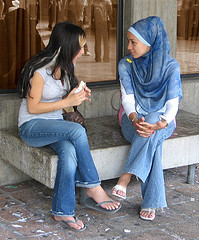3. If I stay here
Listen to the song I don't want to talk about it and fill in the gaps with these words (some of them appear more than once):
mean, stay, hide, tell, broke, talk, listen, stand
probably been crying forever
And the stars in the sky don't
nothing to you they're a mirror
I don't wanna about it
How you my heart
If I here just a little bit longer
If I here won't you to my heart
Oh oh my heart
If I all alone will the shadows
the colours of my heart
blue for tears, black for the night
fears the stars in the sky
don't nothing to you they're a mirror
I don't wanna about it
How you my heart
If I here just a little bit longer
If I here won't you to my heart
Oh oh my heart
In section one, we learned that 'gonna' is often used instead of 'going to' in colloquial spoken English, and it is therefore often found in songs. In the song we have listened to in this section, there is a similar example: 'want to' can also be said 'wanna' in the same contexts as 'gonna'. Read the lyrics again and you will find it in there.
 |
| By Beppie K, C. Commons |
| COLLOQUIAL FORM |
BETTER USE |
|
| wanna | = |
want to |
| gonna | = | going to |
Example of colloquial conversation between friends:
- What do you wanna do tonight?
- I wanna go out.
Read the following conditional sentence and answer the questions:
If I stay here, I will see my friend.
- In which tense is the verb in the 'if' part?
- In which tense is the second part of the sentence?
Remember 'will' can be contrated as 'll, especially in spoken English.
Example:
If I stay here, I'll see my friend.
According to the rules you have just learned, complete the gaps in the following sentences.
Remember the structure:
| IF + PRESENT SIMPLE, WILL + INFINITIVE |
And remember as well that the third person singular in the present simple takes an -s!
1. If it
, I
at home. (rain, stay)
2. If you hard, you the exam. (work, pass)
3. If you for me, I with you. (wait, go)
4. If he early, we to the cinema. (arrive, go)
5. If I at home, I a film. (stay, watch)
You've seen the first type of conditional sentences in this section. You are going to learn about the second type in the last section. But first, you are going to learn about the modal verb 'would. Let's go!